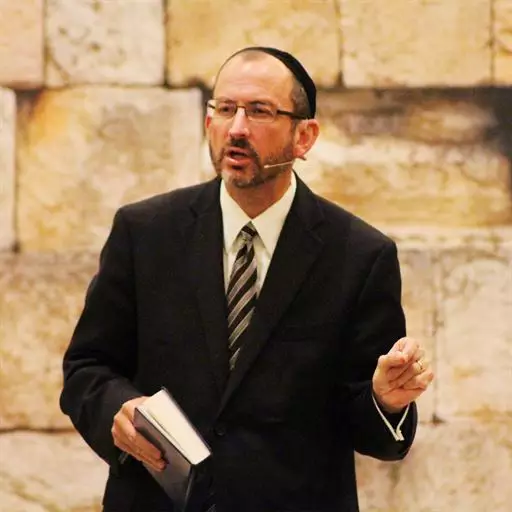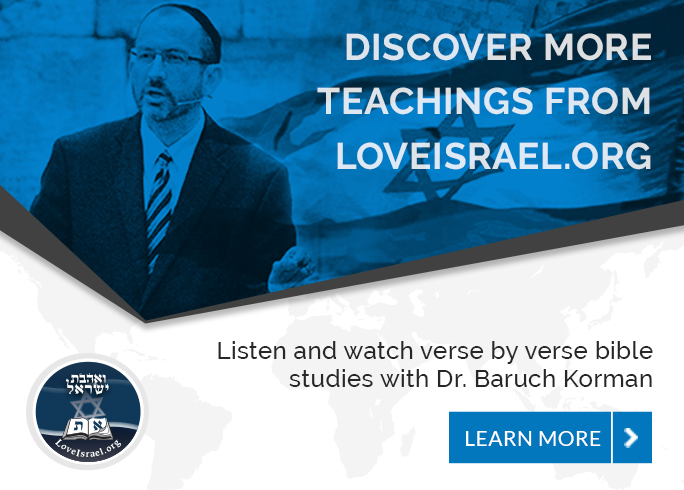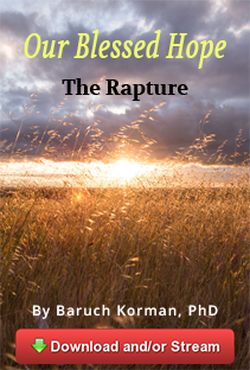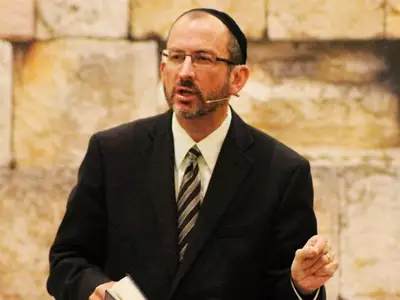Speaker 1
Shalom. And welcome to Via Hafta Yisrael, a Hebrew phrase which means you shall love Israel. We hope you'll stay with us for the next 30 minutes as our teacher, Dr. Baruch, shares his expository teaching from the Bible.
Dr. Baruch is the senior lecturer at the Zarah Avraham Institute based in Israel. Although all courses are taught in Hebrew at the institute, Dr. Baruch is pleased to share this weekly address in English.
To find out more about our work in Israel, please visit us on the web at loveisrael.org—that's one word, loveisrael.org.
Now here's Baruch with today's lesson.
Speaker 2
As believers and followers in our Messiah, we have a glorious future. Now, I want to use a word, and that word is end. We will end well in this world. In fact, we will exit this world in the end, and we will enter into the kingdom of God, which has no conclusion, no end. And it's a place of glory. It's a place where we will receive and benefit from the promises of God and the blessings of God. So we have a wonderful and an eternal future that ends perfectly and gloriously for everyone who believes in the promise of the Messiah and not just believes that there's a promise from a coming Messiah. But we have to be specific. We have to know the name of the Messiah, and it's Yeshua or in English, Jesus. And we have to receive him and enter into that new covenant, that kingdom covenant.
Now we're going to focus in on this study on a psalm that King David wrote. This psalm is called a mosquito, and that comes from a Hebrew word which is in the causative stem. What does that mean? It makes or causes you. The root of this word has to do with understanding or intelligence or knowledge. So when we put into practice what we learn in this psalm, it is going to cause us to be wise, to have understanding, to grow in spiritual knowledge. And it's going to influence our life. When our lives are influenced by the truth of God, we are going to be more than conquerors.
So with that said, take out your Bible and look with me to the Book of Psalms and Psalm 142. The book of Psalms, Psalm 142. Now, when we take seriously these words and when I say take seriously, what I mean is when we are wise enough and humble enough to apply the truth of this psalm to our life, it is going to have a great impact upon us. What does that mean? It's going to cause us to be different, to think differently than those who belong to the world. And not just think differently, but behave differently. We are going to act with wisdom and understanding and knowledge and all of those things. Wisdom, understanding, and knowledge. Not a worldly knowledge, but rather a kingdom wisdom, a kingdom understanding. And when we display that, we are also going to have a testimony. We are going to bear witness by our decisions, our words, and our actions of the kingdom of God and his glory.
So, as I said, look with me to this Psalm, Psalm 142. We see here, and let me read it word by word. It says, Masil le David, which means a particular type of psalm, as I said, one that imparts knowledge and wisdom and understanding to those who learn it and apply it to their life. It says Mas, meaning David is the one who wrote the psalm. Now, David wrote the majority of the Psalms we find in the book of Psalms. And when we examine these Davidic psalms, you know what we learned? David didn't have an easy life. David suffered greatly. But God, in spite of these difficulties, used David in a mighty way. So don't think that if you know biblical truth, if you are faithful to the word of God, that you're going to escape sufferings. No. We are called to suffer in this world. Why? This world is hostile to the things of God. That's why ultimately God will judge this world. He will bring this world to a conclusion, and he will begin a new world.
And that new world we talk about, the new heavens and the new earth, is called the new Jerusalem. It has a kingdom character and kingdom benefits because the New Jerusalem is where we will be partakers of. We will inherit the will of God. And what is God's will? To bless his people. We see that going back to the Abrahamic covenant, where God says, in you and your seed, all the families of the earth will be blessed. So this psalm gives us insight on how to live a blessed life. And that just doesn't mean that we are blessed, but we become an instrument of blessing others.
Moving on, we have in this inscription in verse one some important information. This psalm was relevant for David when it says when he was in the prayer cave. That's literally what it says, in the prayer cave. Now, there are different understandings of what David meant by this. We know one time when King Saul was pursuing him, when he was in the area by En Gedi, David hid in a cave. And who came into that cave? King Saul. David could have killed him, but he did not. Remember that he cut off the tits, meaning those fringes from Saul's garment. Now, that is usually done when someone is dead or when we are in a cemetery among the dead. We hide them into our garment, into our pants, so that they're not visible. So it's a sign of death. David could have killed him, but he did not. Why? He was a man of prayer, and therefore he always relied upon God, trusted God, and was dependent upon God for his deliverance.
And so we're not sure about what prayer cave we're talking about, but many scholars believe that. And what was David doing in that prayer cave? Whether it was in that one at En Gedi, or whether he would simply go to a place for prayer, and that place was a cave where he could be alone, could be different and separated from the world and the responsibilities of the world. It says here, look at the next verse in my Bible, verse two, perhaps verse one in yours, where he says, my voice is to the Lord. Now, when he says that, he modifies it at the end of this sentence because we see the word as act. What is that? To yell or to scream? It is to speak out in a loud voice. So what we see here is that David is saying in this prayer cave, he says, my voice is to the Lord. And the implication is I will cry out, I will yell out. He says something similar. He says, my voice is to the Lord and I will. We might translate that I will make supplication or I will beg. It's a term of making a request in the most humble way. So David is beseeching. David is begging God.
Now, that usually gives us an indication of two things. First of all, David is in a difficult circumstance, and he's turning to God because, as we'll see in a moment, there is no other help available to him. Now, that's okay because you can't find better help than God. He is the best source of help and assistance and deliverance. And David knows that. David has experienced that many times in his life that relying and trusting and dependence upon God leads to a good ending. So he says here, look at the end of this verse, my voice is to the Lord, I will supplicate. Now, that word, supplicate, it is a word of begging. But we also see in it the word hen, which is related to grace or favor. So David is beseeching God. He's requesting from God. He's supplicating God for God's favor, for God's grace.
And this is very important because the biblical word for grace relates to the will of God. David just doesn't want to be delivered and removed from those problems, those obstacles, those hardships in his life. In the midst of that, David still wants to obey the purpose of God, to be obedient to the will of God. And that is the foundation of his prayer. Realize when we go through difficult times and circumstances, I would say more often than not, the source of that is the enemy. And what is the objective of that enemy? He wants to discourage us. He wants to get us to stop being committed to God. So he wants to discourage and he wants us to turn us away from the will of God.
Moving on to the next verse, verse three in my Bible, perhaps two in yours. He says, I will pour out before him. And we have the word, which means my conversation. Now, this is informative to me because it tells us what prayer is. Remember, where is this taking place? In the prayer cave. And what is David doing? He's having a conversation with God. So he says, here, I will pour out. And this kind of means that he is really struggling and he is pouring out. He's bearing his soul, he's pouring out his heart unto the Lord. But it says here, my conversation, what is on David's mind? And we know what that is if we keep reading. The next word is serati, which relates to trouble or hardship of the most intense variety. So he's pouring out his heart before God concerning the trouble that is before him. And what is he saying? My trouble before him, meaning before God. I declare now what this is saying is that David is holding nothing back. David is putting everything out there. He's burying his soul. He's opening up all things of what he feels, what he's going through. He's declaring that to God. He's making that proclamation.
And it's a word here, agid, which is indeed to proclaim, to make known, to declare. Look now at verse four in Hebrew, verse three, probably in other Bibles, where David again reveals what he's going through. Now we have the word bay here, that means when hit, atf. Now, hit a tef can mean usually to be wrapped up in something, but it also has another meaning, and that is to be overwhelmed. Oftentimes this word can also be used to faint from exhaustion. And this is David's situation. He is overwhelmed with the circumstances of his life. He is going through something very, very difficult. And what is he doing? He goes into his prayer cave. People today might say their prayer closet. They get alone, separated from the world, and they pour out their feelings before God. This is what David has done, and this is what we should be doing.
So when we feel overwhelmed, what David says, when I was overwhelmed. And he speaks specifically here he has a word, ruchi, my spirit. So when my spirit was overwhelmed, unto me, he is totally overwhelmed. He is fading from what he's going through. He is ready to collapse, is what he's saying. And he says, and you have known my lane, now uses the word native in modern Hebrew. It's just that, a lane. We're traveling on a highway. You travel in your lane. And David is speaking here about being in his lane. And he says, God, you know my lane, meaning, you know how I travel, you know how I go. And then we have another word, be orach. Zoo. Well, orach is again a pathway, a road, a place that one travels in. So David is saying two times. You know my way, you know my lane. You know how I'm traveling through life, what I'm doing.
And he says here, in this way I walk. Now, David is talking here about a lifestyle. He is showing God how he lives. He says, God, you know how I live. You have known this. There's a history between David and God, what David does, what David values, how David lives, the decisions he makes. And he says here, what have they done? They. And the implication is, and we'll see this in a moment, there are those who are persecuting David, there are those who are against him. And what have they done? They have hidden. And we have the word pa, which is like a snare or an obstacle, or we might just interpret it to be a trap. They have set a trap for me. And therefore, what does he do? He doesn't give up. He doesn't run away and hide. He doesn't stop. But he says to God, look. And it's a word for looking intently. So it's not just giving a quick observation of what's going on, but it's to look thoroughly. It's a word of paying close attention. He says, look at. And the implication is at the right. And see. So David is saying at the right. And that is a word of integrity. So he's saying, look at my integrity, my commitment, how I live my life.
He's pouring everything out. You can't lie to God. David knows this, so he's sincere. And he says, look. This is the second time he's asked God in this verse to look. The first time, the word hebeit, which means to look intensely. And then we have the common word for look. He says, look, There is not to me. And we have the word makir, meaning anyone who acknowledges that is literally what that word means. Now when I look at the biblical text and I look underneath it, I am using a special book that has modern Hebrew underneath it, and it has the word yadid, which is friend. But what David is literally saying is there is no one who acknowledges, and the implication is acknowledge me. There's no one who's familiar to me. I have no one around to support, to assist, to help me. What he's saying is I am totally alone. And it gets worse than that. He says avad, which means to perish or to be lost or to be destroyed. And what has been destroyed, we have the word manos, which is a way of fleeing. What David is saying here is that I have no escape there. There's no place I can run, there's no place I can go. There is no help for me anywhere. All of that has perished, all that has been destroyed. And he says, my way of fleeing has perished. And then he says again, there is no one that seeks, and it says, my soul. But when we look at again what he means, no one is seeking the goodness for my soul, meaning for me. So David, and what is being expressed here is that he's alone. There's no one that is acquainted with his situation who is acknowledging it. No one cares about it. David is alone. And all the ways to flee, to escape, have been destroyed. And no one is seeking anything good for him. David is utterly alone. But he's not alone because God is there. And God is connected to David through covenant. David is connected to God through his call, God's call on his life. And secondly, or thirdly, actually he is connected to God through prayer.
Now, if you're a believer, you are in a new covenant relationship with the living God through Messiah. That is a wonderful place to be in because you have a connection with God and through prayer. And as believers, our prayers are always making their way before God. Therefore we are connected to him through covenant, through faith, and through prayer. Look now to verse six in my Bible, probably verse five in yours we have another time this word sak. Now earlier on when we went back, we have in verse two in my Bible where it says as act, I will cry out, I will scream, I will yell. Well, here we have something similar. He says in this verse. Now we're back in verse six, probably five in yours I have cried out unto you, O Lord. I have said, you are my refuge and my portion, and the land of living What David is saying here in no uncertain terms, God, you are my everything, all who I am, I bring before you. Notice what he says. He says, you are my refuge. This word maxi. So you are my refuge or my shelter, my portion in the land of living, in this world. You are my portion, you are what I have. And if we have that, that relationship with God through Messiah, you know what? We have everything because God owns all. If we make him our portion through faith, through that gospel message, we have access to everything that God has. And he has it all.
Look now to verse seven, verse six. In most other translations, he says haksheva, which means listen, listen to. And we have a word for shout, my shout. Now, this is a word that shares with us that David isn't being quiet. David is crying out, David is yelling. David is pouring out his heart in a most loud manner. Because this is important to David. This is serious stuff. And he says, listen to my shout for. And we have a word which means lowly. And we have an adjective, very low. Now, when I look again, we have a word for weakness. And what David is saying is, not only is he very low, oftentimes people might be in a very difficult circumstance, and that brings them low. We're not necessarily talking about humanity, but they are thoroughly and utterly discouraged. They have no power. Because when we're depressed and discouraged, it just takes our energy. And therefore David is saying, here, you need to hear my cry, because I am most low, very low, very weak. And then he says, save me. Save me from my persecutors, because they are stronger than me.
So David, he is being persecuted. He is going through intense trouble. He is going through a most difficult and oppressive situation. And who is he? He is King David. And the message I have is this. If David, whose name means beloved, if David is going through that, never think, well, I won't suffer, I won't go through hard times, I won't be persecuted. David, he says here in this verse, we're still in verse seven, verse six, in yours, he says, deliver me or rescue me. Now, this is a word, interesting. In the noun form, this is a verb. But in the noun form it is the word matzil, which is like a lifeguard, very similar to the Hebrew word Moshe for a savior. So he's saying, save me, deliver me, rescue me from the ones who persecute me, because they are stronger than me. Now, that can mean stronger or more numerous.
Let's conclude. Let's go to the last verse, verse eight. In my Bible, verse seven, and yours, where he says, bring out my soul. Now, David, when he speaks about himself, he uses that word nephesh. He's talking about the inner being, that inner man, which is the real essence of a person. So David is praying this way about the very essence of who he is and everything that his life amounts to. He says here, bring forth my soul from where? Muscare. This is probably referring to a prison, but not necessarily a prison like we think of it, where someone who's convicted of a crime is sent. No, he's talking about a spiritual prison, a time of being held in affliction, feeling that there's no way out, that he is confined. So he says to God, bring forth my soul from this, this captivity, this prison, this place of oppression.
And why does he want that? What is David interested in? Why should you pray? Maybe just close your Bibles for a moment and let me ask you a very significant question. Why do you want God to answer your prayers? Why do you want God to help you in difficulties? In other words, why do you want him to solve those problematic times in your life? To deliver, to help, to assist? You know what the right answer is? So that you can worship God. That's what David says. Here he uses the word lehodot, which means to give thanks. And
Speaker 1
Well, we hope you will benefit from today's message and share it with others. Please plan to join us each week at this time and on this channel for our broadcast of love israel.org again.
To find out more about us, please visit our website, love israel.org. There you will find articles and numerous other lectures by Baruch. These teachings are in video form. You may download them or watch them in streaming video.
Until next week, may the Lord bless you in our Messiah Yeshua, that is Jesus, as you walk with Him. Shalom from Israel.

 Learn How
Learn How






